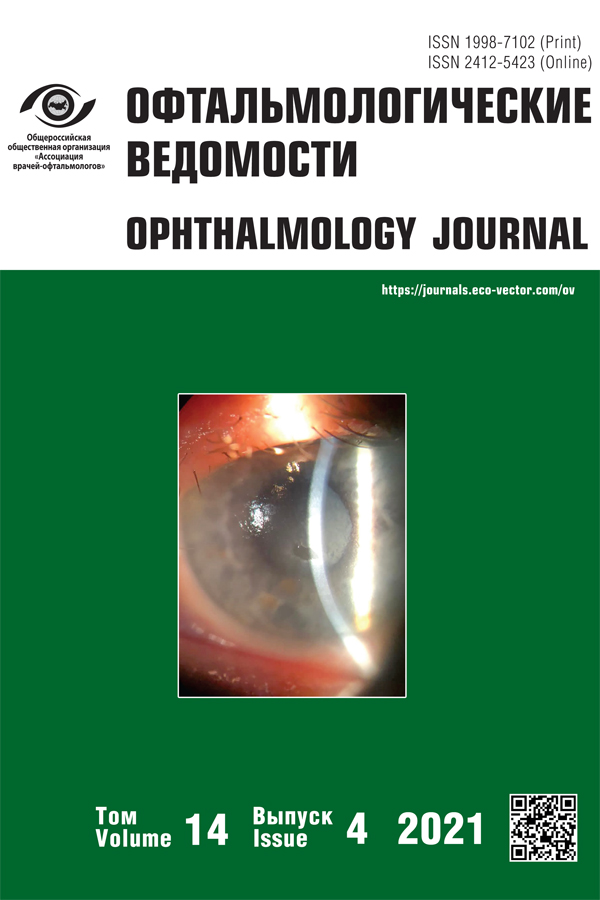Comment on the article “Pathomimia in a practice of an ophthalmologist”
- Authors: Davydov D.V.1
-
Affiliations:
- Peoples’ Friendship University of Russia
- Issue: Vol 14, No 4 (2021)
- Pages: 79-81
- Section: Discussions
- Submitted: 24.02.2022
- Accepted: 03.03.2022
- Published: 15.12.2021
- URL: https://journals.eco-vector.com/ov/article/view/101588
- DOI: https://doi.org/10.17816/OV101588
- ID: 101588
Cite item
Abstract
Comment of the Editor-in-chief on the article by Potemkin V.V., Marchenko O.A., Goltsman E.V., Anikina L.K., Gladysheva E.K. “Pathomimia in the practice of an ophthalmologist”, 2021, V. 14, No. 4.
Full Text
In the journal portfolio with scheduled publications, the manuscript “Pathomimia in the practice of an ophthalmologist, a complicated clinical case” describing a clinical case, written by V.V. Potemkin, O.A. Marchenko, E.V. Goltsman, L.K. Anikina, and E.K. Gladysheva aroused great interest.
This clinical case belongs to the section of ophthalmology “Ophthalmic Plastic and Reconstructive Surgery.”
Patients with eyelid problems often visit not only ophthalmologists but also doctors of other surgical specialties, such as plastic surgeons, maxillofacial surgeons, dental surgeons, ear–nose–throat surgeons, oncologists, and dermatocosmetologists. Given the differences in the training and specificity of subspecialties, concepts of the treatment plan can be varied, which sometimes ends up not in favor of the patient’s health. Undoubtedly, during the initial examination in the in-patient facility and familiarization with the submitted medical documentation, the attending ophthalmologist is certain about the veracity of the oral information provided by the patient. However, the general appearance (such as the presence of multiple flaps, scars, and deformities of the soft tissues of the face and nose) should have alerted the ophthalmologist and contributed to an attempt to prescribe intensive conservative treatment, including nonsurgical methods for closing the gaping palpebral fissure, not only as the main method of treatment but also, to a greater extent, the assessment of the situation with the patient, adequacy of the patient’s response to the proposed method of treatment and further rehabilitation, and possible repeated consultations.
The obsessive conditions identified during the consultation (such as the search for foreign bodies, silicone, constant touching, and traumatization of affected areas) should first alert the surgeon involved in the correction of soft tissues of the face, eyelids, and protruding parts of the face about the patient’s mental status and adequacy of perception of information about the upcoming treatment. A successful surgery in such patients does not ensure stable outcomes in the immediate and long-term postoperative periods. Such patients may perceive emotionally the restoration of the correct forms or the closure of a tissue defect as an attempt by a surgeon to conceal a physical problem from the patient, a return to a “hostile form,” which subsequently may stimulate the patient to repeatedly search for nonexistent foreign bodies or foreign materials and detachment of formed flaps, introducing infection into the wound surface, which can negate completely the surgical results.
Given the inadequacy of the analysis of the postoperative status, the patient was likely to blame the operating surgeon for the complications and to file complaints against the surgeon and the clinic to the relevant institutions, seeking material consideration or resorting to physical intimidation.
One of the main aspects in medicine is the observance of “treating the patient, not the disease.” An in-depth analysis of the patient’s psychological status at the initial consultation, allocation of conditional categories of patients (according to Per Heden), and identification of the exact category of the patients who regard inadequately their clinical situation will significantly determine the correct plan for further rehabilitation, avoid interventions with negative results, and preserve the health of the operating surgeon and tranquility of the administration of the medical institution.
About the authors
Dmitry V. Davydov
Peoples’ Friendship University of Russia
Author for correspondence.
Email: d-davydov3@yandex.ru
ORCID iD: 0000-0001-5506-6021
SPIN-code: 1368-2453
Dr. Sci. (Med.), Professor, Head of Department of Reconstructive and Plastic Surgery with an Ophthalmology Course
Russian Federation, MoscowReferences
Supplementary files









